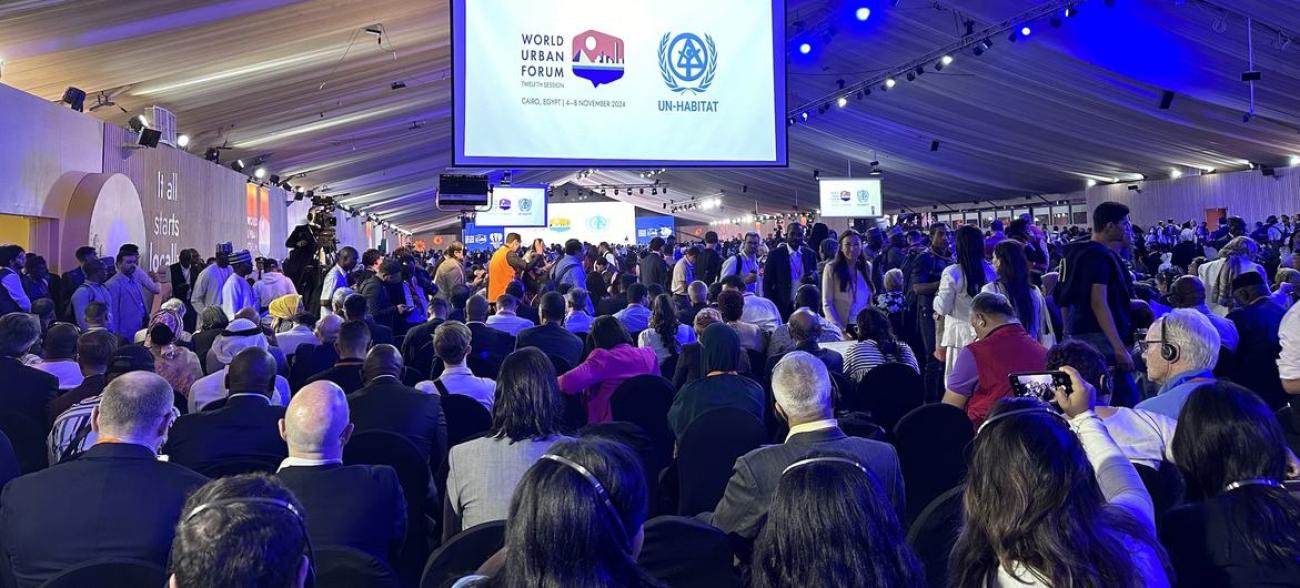RCs Take the Lead on Local Action at World Urban Forum

Last week Cairo hosted thousands of delegates from around the world for the twelfth session of the World Urban Forum (WUF12), marking the first time the forum was held in a megacity. With Cairo's population exceeding 20 million, it provided a fitting backdrop for discussions on the critical challenges and opportunities facing urban areas today.
United Nations Resident Coordinators (RCs) from countries across the globe, including Morocco, Egypt, Ethiopia, Senegal, Nepal, Saudi Arabia, Türkiye, Albania, Mexico, and El Salvador and Belize, actively participated in WUF12, emphasizing the crucial coordinating role they play in bringing together the UN system, national governments, and local authorities to drive action on sustainable urban development.
A key highlight of their engagements in Cairo was the "ONE UN Roundtable," a platform for UN entities, RCs, multilateral development banks, and national government representatives to strategize on how to best support local governments in achieving the Sustainable Development Goals (SDGs), with a special focus on financing the SDGs at the local level.
The delegation in Cairo was led by the Resident Coordinator in Egypt Elena Panova, who highlighted that “development happens at the local level. All sectors and systems coalesce at the local level. Local and regional governments are the point of contact with the people. This is why local and regional governments are key partners for SDG acceleration.” Ms. Panova underscored the crucial role that RCs play in bridging national, regional, and local governments, ensuring that the SDGs are effectively localized and that local achievements contribute to national progress. This bridging role was evident throughout the forum, as RCs shared examples of successful local initiatives from their respective countries.
Bridging the Gap: Insights from RCs at WUF12
The RCs in attendance at WUF12 emphasized the importance of local action in achieving the SDGs and highlighted the key role of development coordination at the country-level.
The Resident Coordinator in Mexico, Peter Grohmann, stressed that "empowering local governments through resource mobilization, legislative reforms, and financial support can unlock their potential to drive sustainable development." He showcased concrete examples of this empowerment, such as a virtual platform connecting public policies to the SDGs and aligning development plans across all states, illustrating the tangible impact of such efforts.
Building on this theme the Resident Coordinator in Türkiye, Babatunde A. Ahonsi, highlighted the importance of training for local governments, stating that "the UN could provide specialized training on financial management for sustainable development, empowering local leaders with the skills to attract and manage financing." He further emphasized the UN in Türkiye's commitment to these efforts, by sharing an example where the Resident Coordinator’s Office (RCO) partnered with the Turkish Court of Accounts to develop a Toolkit for SDG Auditors in Türkiye and the Supreme Audit Institutions in the region to help conduct audits at public authorities, including municipalities.
Meanwhile, the Resident Coordinator in Senegal, Aminata Maiga, highlighted the importance of local governments taking charge of achieving the SDGs as they are closest to identifying the greatest areas of need and thereby impact. She highlighted that "UNCDF (United Nations Capital Development Fund) Senegal’s approach emphasizes empowering local governments to drive SDG implementation in the areas where gaps are most prominent, such as infrastructure." She also highlighted the need to map financial needs according to vulnerability assessments, identifying communities most at risk due to climate change, poverty, and a lack of public services.
The Resident Coordinator in Nepal, Hanaa Singer-Hamdy, noted the importance of financing for local SDG implementation, stating that "with over 60 per cent of SDG targets directly linked to the responsibilities of local authorities, accelerating progress toward these goals must be driven by local efforts." In Nepal the UN is supporting the government in streamlining and reorienting financial resources through the Integrated National Financing Framework. Alongside, bringing together multiple partners, identifying sources of finance, and facilitating policy dialogues to redirect financial resources toward sustainable development.
Underscoring the importance of localized data in achieving the SDGs, the Resident Coordinator in El Salvador and Belize, Raul Salazar, emphasized that "establishing standardized methodologies to assess development at the territorial level is crucial. Access to disaggregated and localized data allows us to set actionable targets and direct resources effectively; however, data gaps at the municipal level in many countries often limit tailored solutions." Mr. Salazar advocated for supporting local data assessments and analyses and highlighted a concrete example in El Salvador. To address the need for robust data the UN Development Programme (UNDP) developed the “Socioeconomic Map: Guide for the 44 New Municipalities of El Salvador”, providing a statistical overview of the socioeconomic characteristics of the municipalities. This study, Mr. Salazar explained, offers a valuable opportunity for UN entities to support local authorities, develop integrated solutions, and build strong alliances with local governments.
The Way Forward
As the world continues to urbanize, it is essential that local governments are empowered to take the lead in achieving the SDGs, with necessary data, capacities and finance in place. RCs, with their unique convening power and ability to foster multi-stakeholder partnerships, are well positioned to support this effort. By working together, the UN system, national governments, local authorities, and other stakeholders can create more sustainable, inclusive, and resilient cities.













